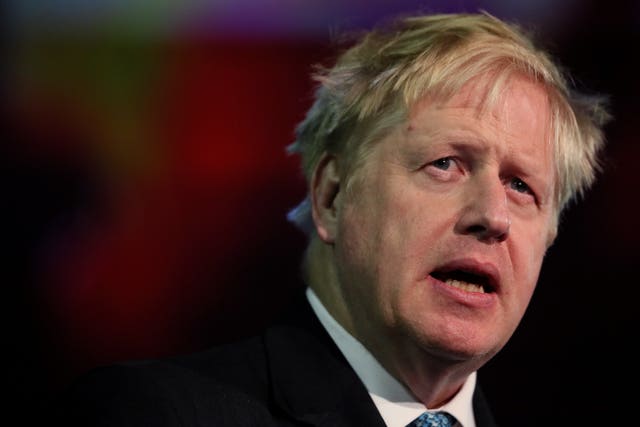
Chancellor Philip Hammond has refused to rule out supporting a no-confidence motion in the Government if the next Tory leader goes for a no-deal Brexit.
As the battle for Downing Street hotted up with the entry of Environment Secretary Michael Gove into the fray, Mr Hammond insisted Theresa May’s successor would be defying Parliament if they took the UK out of the EU without an agreement.
Leadership contenders Boris Johnson, Dominic Raab, Andrea Leadsom and Esther McVey have said they would be prepared to quit with no deal on October 31 if necessary.
Mr Hammond told BBC One’s The Andrew Marr Show: “I think it would be very difficult for a prime minister who adopted no deal as a policy – we are leaving with no deal as a matter of policy – to retain the confidence of the House of Commons.”
Asked if whether he would vote against the Government on a no-deal withdrawal if he was a backbencher in the autumn, the Chancellor said: “I would certainly not support a strategy to take us out with no deal.”
On whether he would vote against the Government in a confidence motion in the circumstance of no deal, Mr Hammond said: “It’s a hypothetical question because I don’t know what the confidence motion is.
“What I would say is that, in 22 years in Parliament, I have never voted against the Conservative whip, unlike many of my colleagues, and I don’t want to have to start now contemplating such a course of action.”
He added: “I would find it very difficult to vote for a no-deal Brexit, but I have never voted against my government, or my party, in the 22 years that I have been in Parliament.
“And I don’t want to be put in that situation. So my focus will be trying to ensure that I don’t find myself facing that challenge.”
Asked again if he could vote against the Government on a confidence motion, the Chancellor said: “I’m saying this is a very difficult situation. It would challenge not just me, but many of our colleagues, and I hope we will never get to that position.”
Mr Hammond said talk of a renegotiation before the end of October was a “fig leaf for a policy of leaving on no-deal terms” due to the summer break and the fact a new EU commission will not be in place until the autumn.
He said: “That policy has a major flaw in it … and that is that Parliament has voted very clearly to oppose a no-deal exit.
“A prime minister who ignores Parliament cannot expect to survive very long.”
Mr Raab said he would prefer a deal, but Britain had to show it was prepared to walk away in negotiations with the EU.
He told the BBC: “I would fight for a fairer deal in Brussels with negotiations to change the backstop arrangements, and if not I would be clear that we would leave on WTO terms in October.
“We need to go out and be absolutely resolute in the way we weren’t last time.
“It is achievable, but it will need some goodwill on the other side too.”
He added: “I will not ask for an extension. Of course, if Parliament legislates that then we would be in a difficult position.”
Mr Gove told the Press Association: “I can confirm that I will be putting my name forward to be prime minister of this country.
“I believe that I’m ready to unite the Conservative and Unionist Party, ready to deliver Brexit, and ready to lead this great country.”
As the Tory battle for Downing Street intensifies, Mr Gove’s intervention is likely to cause concern to current front-runner Mr Johnson.
A spectacular falling-out between the two former allies in the 2016 leadership contest helped destroy both men’s chances of the top job.
Mr Gove is posing as a self-styled “unity candidate”.

Ms McVey told Sky’s Sophy Ridge On Sunday that the UK must start preparing for a no-deal exit straight away.
She added: “October 31 is the key date and we are coming out then, and if that means without a deal then that’s what it means.
“We won’t be asking for any more extensions.”
Mr Hammond’s Parliamentary Private Secretary (PPS) said a second referendum is inevitable.
Tory MP Huw Merriman told BBC Sunday Politics South East: “I think a second referendum is inevitable. It’s not something I ever wanted because I wanted to pursue Leave.
“But, we’ve seen a majority of MPs continue to vote for nothing, no majority for anything, which means we can either carry on in this vein or be realistic and say we’re going to have to put this back to the people to make a decision.”
The new Tory leader looks set to take over as prime minister at the end of July after Mrs May finally laid out a timetable for her exit from Downing Street.
The timetable for the contest will see nominations close in the week of June 10, with MPs involved in a series of votes to whittle down the crowded field to a final two contenders.
Tory Party members will then decide who wins the run-off.


Comments: Our rules
We want our comments to be a lively and valuable part of our community - a place where readers can debate and engage with the most important local issues. The ability to comment on our stories is a privilege, not a right, however, and that privilege may be withdrawn if it is abused or misused.
Please report any comments that break our rules.
Read the rules hereLast Updated:
Report this comment Cancel